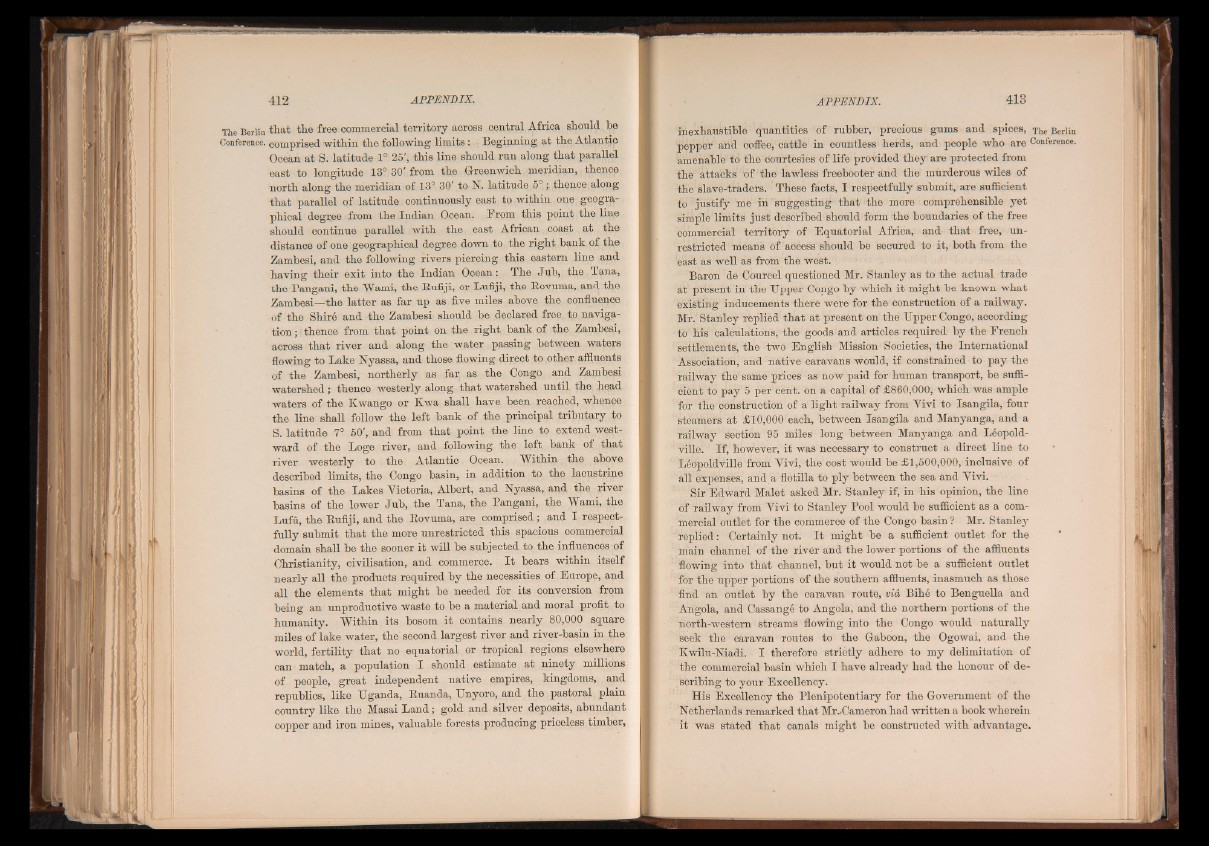
The Berlin th a t the free commercial territory across central Africa should he
Conference, comprised within the following limits : Beginning a t the Atlantic
Ocean at S. latitude 1° 25', this line should run along th a t parallel
east to longitude 13° 30' from the Greenwich meridian, thence
north along the meridian of 13° 30' to N. latitude 5° ; thence along
th a t parallel of latitude continuously east to within one geographical
degree from the Indian Ocean. From this point the line
should continue parallel with the east African coast a t the
distance of one geographical degree down to the rig h t hank of the
Zamhesi, and the following rivers piercing this eastern line and
having their exit into the Indian Ocean: The Jifb, the Tana,
the Pangani, the Wami, the Eufiji, or Lufiji, the Rovuma, and the
Zamhesi;—the latte r as far up as five miles above the confluence
of the Shire and the Zamhesi should he declared free to navigatio
n ; thence from th a t point on the rig h t hank of the Zambesi,
across th a t river and along the water passing between waters
flowing to Lake Nyassa, and those flowing direct to other affluents
of the Zamhesi, northerly as far as the Congo and Zamhesi
watershed ; thence westerly along th a t watershed until the head
waters of the Kwango or Kwa shall have been reached, whence
the line «Ball follow the left hank of the principal tributary to
S. latitude 7° 50', and from th a t point the line to extend westward
of the Loge river, and following the left hank of th a t
river westerly to the Atlantic Ocean. AVI thin the ahove
described limits, the Congo basin, in addition to the lacustrine
basins of the Lakes Yictoria, Albert, and Nyassa, and the river
basins of the lower Juh, the Tana, the Pangani, the Wami, the
Lufu, the Rufiji, and the Rovuma, are comprised ; and I respectfully
submit th a t the more unrestricted this spacious commercial
domain shall he the sooner it will he subjected to the influences of
Christianity, civilisation, and commerce. I t hears within itself
nearly all the products required by the necessities of Europe, and
all the elements th a t might he needed for its conversion from
being an unproductive waste to he a material and moral profit to
humanity. Within its bosom it contains nearly 80,000 square
miles of lake water, the second largest river and river-hasin in the
world, fertility th a t no equatorial or tropical regions elsewhere
can match, a population I should estimate a t ninety millions
of people, great independent native empires, kingdoms, and
republics, like Uganda, Ruanda, Unyoro, and the pastoral plain
country like the Masai L a n d ; gold and silver deposits, abundant
copper and iron mines, valuable forests producing priceless timber,
inexhaustible quantities of rubber, precious gums and spices, The Berlin
pepper and coffee, cattle in countless herds, and people who are Conference,
amenable to the courtesies of life provided they are protected from
the attacks of the lawless freebooter and the murderous wiles of
the slave-traders. These facts, I respectfully submit, are sufficient
to justify me in suggesting th a t the more comprehensible yet
simple limits ju st described should form the boundaries of the free
commercial territory of Equatorial Africa, and th a t free, u n restricted
means of access should be secured to it, both from the
east as well as from the west.
Baron dé Oourcel questioned Mr. Stanley as to the actual trade
at présent in the Upper Congo by which it might be known what
existing inducements there were for the construction of a railway.
Mr.' Stanley replied th a t a t present on the Upper Congo, according
to his calculations, the goods and articles required by the French
settlements, the two English Mission Societies, the International
Association, and native caravans would, if constrained to pay the
railway the same prices as now paid for human transport, be sufficient
to pay 5 per cent, on a capital of' £860,000, which was ample
for the construction of a light railway from Yivi to Isangila, four
steamers at £10,000 each, between Isangila and Manyanga, and a
railway Section 95 miles long between Manyanga and Léopold-
ville. If, however, it was necessary to construct a direct line to
LéOpoldville from Yivi, the cost would be £1,500,000, inclusive of
all expenses, and a flotilla to ply between the sea and Yivi.
Sir Edward Malet asked Mr. Stanley if, in his opinion, the line
of railway from Yivi to Stanley Pool would be sufficient as a commercial
outlet for the commerce of the Congo basin ? Mr. Stanley
replied : Certainly not. I t might be a sufficient outlet for the
main channel of the river and the lower portions of the affluents
flowing; into th a t channel, bu t it would not be O . a sufficient outlet
for the upper portions of the southern affluents, inasmuch as those
find an outlet by the caravan route, via Bihé to Benguella and
Angola, and Cassangé to Angola, and the northern portions of the
north-western streams flowing into the Congo would naturally
seek the caravan routes to the Gaboon, the Ogowai, and the
Kwilu-Niadi. I therefore strictly adhere to my delimitation of
the commercial basin which I have already had the honour of describing
to your Excellency.
His Excellency the Plenipotentiary for the Government of the
Netherlands remarked th a t Mr ..Cameron had w ritten a book wherein
i t was stated th a t canals might be constructed with advantage.